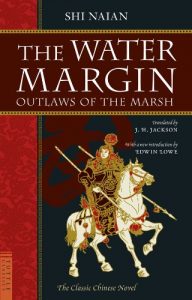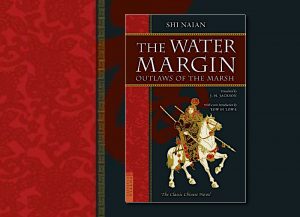THE WATER MARGIN: OUTLAWS OF THE MARSH by Shi Naian (Book Review)
 There is a group of four books labeled the Classic Chinese Novels: Romance of the Three Kingdoms, Journey to the West, Water Margin, and Dream of the Rest Chamber. My father and I have been slowly working our way through them over the years, and he gifted me a copy of Water Margin by Shi Naian this past Christmas. There are multiple revisions of the book and multiple English translations, so I’ll establish now that this particular review is of the Jackson translation as revised by Lowe (he reinstated the sex and cursing that Jackson sanitized out), published by Tuttle in 2010. It’s important to frame the historical context for this one, so to summarize we have a book originally written in the 14th century, translated to English in 1937, and tweaked in 2010.
There is a group of four books labeled the Classic Chinese Novels: Romance of the Three Kingdoms, Journey to the West, Water Margin, and Dream of the Rest Chamber. My father and I have been slowly working our way through them over the years, and he gifted me a copy of Water Margin by Shi Naian this past Christmas. There are multiple revisions of the book and multiple English translations, so I’ll establish now that this particular review is of the Jackson translation as revised by Lowe (he reinstated the sex and cursing that Jackson sanitized out), published by Tuttle in 2010. It’s important to frame the historical context for this one, so to summarize we have a book originally written in the 14th century, translated to English in 1937, and tweaked in 2010.
One of the reasons I enjoy reading classic literature on occasion is that, much like fantasy, it shines a light on what’s constant across the human experience. Gilgamesh is afraid of death. Odysseus wants to be reunited with his family after years of war and wandering. Beowulf is always spoiling for an opportunity to prove himself. Water Margin covers a recurring question in human history: What do you do when your government becomes corrupt and no longer upholds the values of the people? If you live in a modern democracy, it’s a pretty easy answer: vote for and support candidates who will align the law with your values. For someone like Spartacus or Robin Hood, the answer was to rebel.
Water Margin has more in common with the latter. It’s a fantasy novel inspired by historical events and folktales, telling the story of a bandit rebellion that occurred during the Song Dynasty. It’s kind of an anthology-style novel, where the bulk of the book is a series of origin stories for the various characters as they become outlaws and are forced to join the bandits of Liangshan Marsh before the rebellion starts in earnest. In this respect, it’s similar to some tellings of King Arthur where the knights have their individual adventures within the context of King Arthur’s quest to become King of Britain.
I feel like I’ve spent half the review just introducing the book, so let me cut to the chase. Water Margin is pure popcorn. The stories are full of wuxia-style action and over-the-top melodrama. Take, for example, the story of Lu Da. He accidentally murdered a man and took refuge as a monk to escape justice. But life as a Buddhist monk did not suit him at all, particularly the restriction on alcohol, so what did he do? Kicked a wine merchant in the junk, drank a gallon of wine, and went back to beat up all the monks who kept telling him no. Or Lin Chong, whose life was ruined because the decadent son of a corrupt official had a crush on his wife. Wu Song punched a tiger to death. Song Jiang killed his wife after she tried to blackmail him. Li Kui is an cannibalistic maniac who nine out of ten bandits agree needs to chill out. It goes on. As someone who enjoys folklore and mythology, I had a great time with this batch of absurd tales.
The overarching theme of the book is brotherhood. These men were brought up thinking they lived in a society where good behavior and merit gets you ahead, but was really driven by bribery and nepotism. All these men have become outlaws either by their own foolish choices or the machinations of a corrupt government. What binds them is that they’ve all come together to create their own small society that actually practices what the Song Dynasty preached. They may be murderers and outlaws, but they were brothers. As Song Jiang, one of the bandit leaders, put it, “The Imperial affairs are in disorder and corrupt officials are in power; loyal men are ignored; and covetous men are employed. This results in the suffering of the people. We are the agents of Heaven, and have no personal aims.”
As a modern reader, there were a couple points of friction. The morality of this book is ancient and bizarre. It was written at a time where life was cheap and the legal system was cruel, so some people’s reactions to violent events left me scratching my head. For example, the bandits at one point try to recruit a famous warrior. He says he’s busy with other obligations, so the bandits kill his whole family. Rather than going into a rage and seeking revenge, he actually seemed flattered that they wanted him so badly they would clear his schedule for him. Moments like this made me wish I had a history professor holding my hand through this book to help with cultural context. Another sticking point is the misogyny. There are very few positive female characters, and multiple bandit origins involved a cheating wife.
While the translation was very readable, it’s not written like a modern novel. It’s closer to the style of myths and folklore: fast-paced storytelling focused on action and dialogue. Characters are drawn broadly and the book rarely slows down to tell us what they’re thinking. It’s an older form of storytelling more tied to oral traditions than contemporary works. Also, since the translation dates back to 1937, some of the word choices are a little archaic. One final criticism of this edition is that I noticed a lot of typos, like the book was scanned in and printed without sufficient proofreading.
All of my criticisms boil down to a single disclaimer: this is a 700-year-old book and there will be some issues to get over if you want to read it. If you can work past them, though, Water Margin is a wild ride.


The question about Qin Ming is actually quite simple because it was in a desperate situation and had to surrender to the bandits, he must give up his hatred.
https://www.bilibili.com/video/BV125411L7Zq
But usually the four book we put together is 西三金水(west , three, gold, water)
The gold or Jin Ping Mei , an erotica related to “Water” in some characters , though by different author and different time.
And yes the red chamber is at same level or some scholar may think even higher